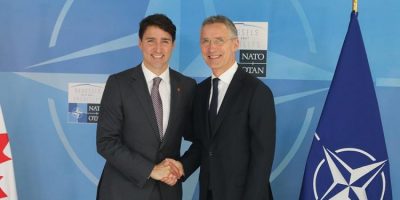Why Canada Should Get Out of NATO

Concerns are growing across this country about the disturbing tilt in Canadian foreign policy toward increasing militarization and aggression – about our participation in foreign wars and US-led ‘regime change’ operations abroad, and about burgeoning defence budgets and rearmament programs, while funding for vital services like education, healthcare and environmental protection are frozen and even cutback.
At the same time however, there is little or no debate at all about Canada’s continuing membership in the NATO military alliance. Neither the parties in parliament nor the mainstream media are prepared to seriously question our NATO status. And yet it is precisely our NATO membership – and the ‘obligations’ that entails – which is the mechanism driving increased military spending and preparations for more aggression and war.
As the NATO generals and their governments prepare to celebrate the 70th anniversary of this aggressive military alliance, it is high time that the peace forces across Canada, and their allies in the labour and people’s movements, put this issue back on the front burner, and begin to build up a grassroots campaign across the country to demand Canada’s withdrawal, and the dissolution of this dangerous military pact as a whole.
NATO’s long and sordid history
Ever since its founding in April 1949, NATO has served as the vehicle to spur the arms race in the name of ‘peace through strength’. In that very same year, the Truman Administration in the United States secretly developed “Operation Dropshot’ to launch a devastating ‘first-strike’ against the former Soviet Union to completely obliterate that country. Throughout the ‘cold war’ years, the U.S. and its NATO allies always maintained an overwhelming military superiority over the USSR and the Warsaw Pact – a fact that they cynically concealed from public view at the time, but now readily admit.
Following the 1991 dissolution of the USSR, NATO – which always professed itself as a ‘defensive shield’ – has instead expanded its military reach right up to the borders of the Russian Federation, throughout Northern Africa and the Middle East, and elsewhere around the globe. It led an illegal 78-day assault on Yugoslavia in 1999 which killed thousands and caused over $100 billion in damages. The imperialist war and occupation of Afghanistan, began in 2001, was undertaken under a NATO mandate. And the 2011 war on Libya – which was once again justified under the pretext of “humanitarian interventionism” – was likewise under the flag of NATO.
Canadian air and ground forces were directly involved in all of these acts of aggression, as part of our ‘commitment’ as a NATO member. And Canadian troops are also stationed in NATO base in Eastern Europe and are helping the pro-fascist regime in Ukraine.
In fact, NATO has now emerged as the primary military instrument of U.S. imperialist domination around the world. It recently recruited Colombia, and has invited Brazil – two of the most right-wing governments in Latin America – to be ‘global partners’, no doubt to increase pressures on the besieged Maduro government in Venezuela.
NATO’s Price Tag
The 2017 announcement by the Trudeau government to raise the annual military budget to $32.7 billion – an increase of over 70% – by 2026, and to commit over $150 billion for the purchase of new warships and fighter jets, is directly connected to our NATO ‘commitment’ to increase annual defence spending to 2% of GDP. U.S. President Trump has called on its NATO partners to further increase defence expenditure to 4% of national GDP, which would mean a staggering annual military expenditure of well over $80 billion for Canada.
Such vast allocations can only be met through massive increase in taxes, or debilitating cuts to social programs for Canadians, or a combination of both. Is this a price working people should be expected to pay – not for defending our shores, but rather to wage aggressive wars abroad?
NATO & Canadian Sovereignty
Every time peace activists raise demands to cut military spending, or to get Canda to sign the UN Treaty to abolish nuclear weapons, or to oppose Canadian arms deals with Saudi Arabia or support other peace initiatives, we are told the same thing by Ottawa and the military-corporate-complex it serves – that this would violate our ‘obligations’ under NATO.
That is why withdrawing from this aggressive military alliance is such a central and pressing priority if we are ever to win a truly sovereign and independent foreign policy based on peace and disarmament, not militarism and war. Of course, withdrawal would be only the first step in winning a fundamentally new program for Canada, but it is a necessary and vital step in that direction.
Canada’s membership in NATO is the ‘pink elephant in the room’ that everyone knows is there but no one wants to acknowledge. It’s time to change that!
*
Note to readers: please click the share buttons below. Forward this article to your email lists. Crosspost on your blog site, internet forums. etc.

